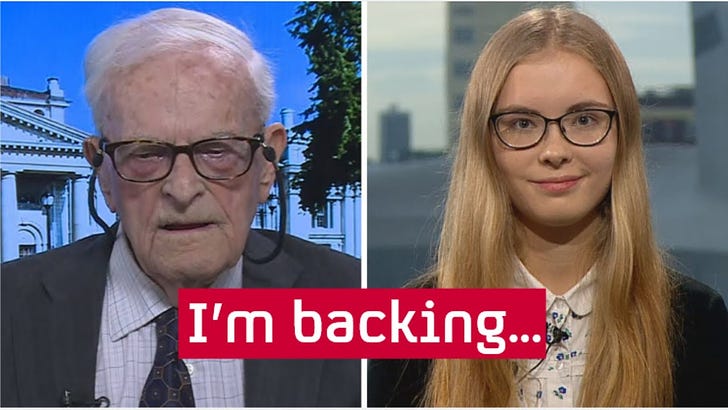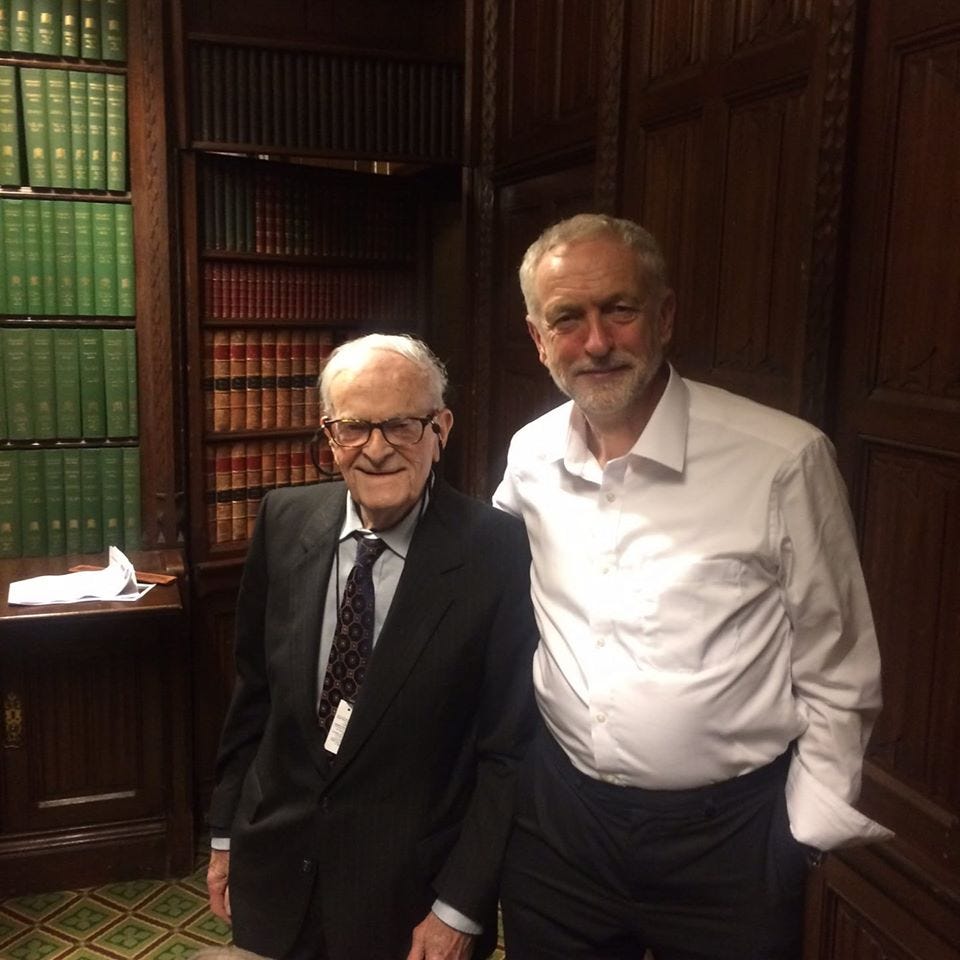Labour's Manifesto for the 2024 General Election was dropped yesterday. Reading it produced the same sensation as drinking warm ginger ale after the bubbles had been beaten out of the pop with a fork.
The 2024 Labour Manifesto was about as hopeful for the future, for ordinary people as an arranged marriage is for a couple press-ganged into a nuptial.
Many Guardian pundits- along with others who make their coin influencing the vote or manufacturing consent, sighed in relief after Labour's Manifesto was published.
They pretended it was a document that finally showed competent adults with a plan- to get the government working again. Working for whom is my question?
Keir Starmer claims his future government will be a "wealth creator," sounds more like the talk of a penny stock salesman to down-on-their-luck investors who don't have a pot to piss in. It's trickle-down economics for the 21st century, and it will leave the people poorer for it.
Society can never be improved or fixed by neoliberalism. Its task is simple; extract wealth and resources from the ordinary by providing them with debt to fund a consumer lifestyle whilst redistributing their assets to the wealthy. The ordinary never notice they are being fleeced because they are too busy complaining that "migrants" are stealing their country in between shopping at ASDA or on a no-money-down holiday in Spain.
And that's why in Labour's 2024 Manifesto you will not find anything as compelling and costed as Labour's 2017 election manifesto that promised real change for the many.
Below is my dad's take on the 2017 Labour Election Manifesto along with a short news interview he gave endorsing Jeremy Corbyn for Labour leader, in 2015. Neoliberalism is never going to allow us a fair, free, prosperous, purposeful and healthy life and so if we don't break its tyranny-it will break us. The choice is ours.
My generation is the last to remember the destitution of life in Britain before the NHS and the welfare state. Heed our warnings, before we are gone.
It was at Bradford University on Tuesday that Jeremy Corbyn unveiled the Labour party’s election manifesto. In the grand hall, Corbyn spoke to an enthusiastic gathering of students and party faithful about the concrete plans Labour has to transform Britain into a country where the many will prosper instead of the few. Corbyn spoke about the need to properly fund the NHS, provide free tuition to students, end the blight of zero-hours contracts, and raise the living wage to £10 an hour.
For me, a man who was born and bred in the harsh poverty of Britain after the First World War, it was inspiring. But what moved me most was the venue he chose to announce this manifesto of equality and fairness – because Bradford University is built on ground that, in my youth, was a site of great suffering and death.
You see, within the boundaries of what is now the university campus, my boyhood dreams and idealism were crushed under the cruel weight of austerity during the Great Depression. When I was young, this was not a place where one’s future was made but where it was condemned. The grounds that now hold this university contained a slum, and hope never penetrated its dark, enveloping canopy of destitution.
My family arrived in the neighbourhood that once covered this well-maintained university as penniless and jobless economic migrants from Barnsley in 1929. Then, it was an endless, warren-like landscape of dilapidated houses nestled in cul-de-sacs where no one expected to enjoy either a decent or a long life because there was no welfare state or NHS. If hard luck struck, all that was available was poor relief, which paid a mean weekly stipend that guaranteed either starvation or homelessness.
My family couldn’t survive on poor relief, so we ended up living cheek-by-jowl in a doss house with a multitude of other desperate characters. Like us, all of them had been washed up on its doorstep like the flotsam that crashed onto a desolate beach after a terrible tempest. Soldiers from the First World War who had been promised a land fit for heroes by lying politicians resided in the doss where my family kipped. During the day, they still tried to hold themselves up bravely.
Like my dad, these Tommies looked for work in a city whose factories had been hushed by the collapse of the world’s economies. But at night, when they tried to sleep, weary from unemployment and PTSD, I heard their cries of terror because their dreams had sent them back into battle at Ypres or the Somme.
As for me, my childhood was a nightmare of indentured servitude and malnutrition. At bedtime, my sister and I would huddle together for warmth on a piss-stained flock mattress on an unlit garret floor. We would try to quell the gnawing in our stomachs by wondering what our king had eaten for his evening tea.
Even while playing, my boyhood was never blissful. In this part of Bradford, I was always reminded that death for the poor is miserable, brutal and lonely. From open windows, I heard the inhuman howls coming from people dying in agony because poverty denied them the dignity of morphine while cancer ravaged their bodies.
But all of that changed in 1945 when, at the end of the Second World War, the Labour Party fought a general election on a manifesto that promised the creation of the NHS, affordable education, an end to that era’s housing crisis and fair conditions for all workers. The Labour Party’s 2017 election manifesto echoes the sentiments found in Labour’s 1945 manifesto that inspired my generation to build a just society.
When I remember all the pain and sadness that once populated the part of Bradford that now houses its university, I can’t think of a better tribute to all those whose lives were blighted by the Great Depression than for Labour to have unfurled its manifesto here for the nation to see.
But I fear that the 2017 manifesto, no matter how just and how right for our times, may not catch the wind it needs to help this country sail forward to hope and prosperity because we forgot the hardships, tragedies, and triumphs my generation experienced. I fear it will be derided by wealthy political journalists and dismissed by those in the Labour Party who march to the drum beaten by the 1%.
I can tell you I am afraid for the future of ordinary people in Britain. There is no future for them except as low-wage servants to the entitled if a proper and just society is not built on the foundations of socialism. .
Your subscriptions are so important to my personal survival because like so many others who struggle to keep afloat, my survival is a precarious daily undertaking. The fight to keep going was made worse- thanks to getting cancer along with lung disease and other co- morbidities which makes life more difficult to combat in these cost of living crisis times. So if you can join with a paid subscription which is just 3.50 a month or a yearly subscription or a gift subscription. I promise the content is good, relevant and thoughtful. But if you can’t it all good too because I appreciate we are in the same boat. Take Care, John P.S there is a discount if you subscribe for this post.




When I read the summary of Labour’s manifesto I noted the almost 1980’s neoliberalism tone. What struck me most is Labour’s very clear message to the wealthy, “get your spare money bags ready because I’m going to see that the poor and the working class fill them.” Starmer is focussing on “growth” and “improved productivity”. Since the 1970s productivity has “improved” by about 1000 times, growth has been enormous, yet the poor are poorer and there are more of them, the working class now work longer hours for less real terms pay, the middle class has been almost eliminated, all public services are in worse shape, but the 1% have repeatedly broken wealth accumulation records even as they have demonstrated their gross incompetence. Starmer’s manifesto will bleed every last penny out of the many to give to the few. One can only hope it leads, finally, to revolution.
The Labour Party has not been fit for purpose since it dumped Corbyn. He was a hope for the future, Starmer is just a reminder of how bad things have become.